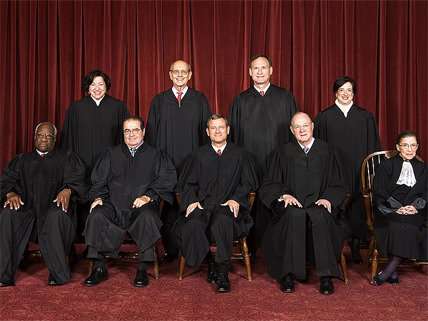Here Are the 7 Supreme Court Cases That Still Remain Undecided

In the next few days, the U.S. Supreme Court is expected to issue its final seven opinions in cases argued during the 2014-2015 term. That final push starts today at 10am ET when the Court will issue one or more opinions. Here are the seven cases that still remain undecided.
Johnson v. United States
The Armed Career Criminal Act of 1984 imposes a minimum federal sentence of 15 years on anyone convicted of being a felon in possession of a firearm who has "three previous convictions…for a violent felony or a serious drug offense." In this case, a member of the Aryan Liberation Movement was sentenced under that statute after a district court found his previous convictions for robbery, attempted robbery, and possession of a short-barreled shotgun to each count as a "violent felony." The Supreme Court will decide whether possession of a short-barreled shotgun should in fact count as a "violent felony" under the terms of the Armed Career Criminal Act.
Arizona State Legislature v. Arizona Redistricting Commission
In 2000 voters in Arizona amended the state constitution to empower an independent redistricting commission to handle the task of redrawing the state's congressional districts. In this case, the Arizona state legislature is challenging the constitutionality of that amendment under Article One, Section Four of the U.S. Constitution, which says, "the Times, Places and Manner of holding elections for Senators and Representatives, shall be prescribed in each State by the Legislature thereof; but the Congress may at any time by law make or alter such regulations."
Texas Department of Housing and Community Affairs v. The Inclusive Communities Project
This case centers on the Fair Housing Act of 1968. Does that federal law allow parties to bring "disparate impact" claims against landlords, businesses, and lawmakers? Or is the statute reserved solely for claims of intentional discrimination?
Michigan v. Environmental Protection Agency
This deals with an anti-pollution rule promulgated by the EPA under the Clean Air Act. According to the state of Michigan and the other challengers, the EPA disregarded congressional directions and failed to properly take costs into account in its power plant regulations. The EPA, by contrast, maintains that its actions are perfectly legitimate under the broad regulatory powers it possesses under the Clean Air Act.
Glossip v. Gross
The state of Oklahoma employs a three-drug protocol when carrying out the death penalty via lethal injection. The first drug is supposed to render the prisoner totally unconscious and insensate. The second drug is a paralytic. The third drug does the killing. But what if there is a lack of medical consensus about whether or not the first drug actually renders the prisoner unconscious and insensate? What if paralyzed prisoners sometimes suffer excruciating pain in the final minutes before death? Would that lack of medical certainty about the drug's effects violate the Eighth Amendment's prohibition against imposing cruel and unusual punishments? This case centers on those questions.
Obergefell v. Hodges
Do state legislatures have the lawful power to prohibit gay marriage? Or do state bans on gay marriage violate the 14th Amendment, which forbids the states from denying the equal protection of the laws to any person within their respective jurisdictions? In Obergefell v. Hodges, the Supreme Court confronts the possibility of legalizing gay marriage nationwide.
King v. Burwell
The question before the Supreme Court in King v. Burwell is whether the Obama administration illegally implemented the Patient Protection and Affordable Care Act (ACA) when the IRS allowed tax credits to issue to certain persons who bought health insurance on federally established health care exchanges. According to the text of the ACA, such tax credits should only issue in connection with purchases made via an "Exchange established by the State." According to the Obama administration, however, the phrase "established by the State" is actually a "term of art" that encompasses exchanges established by both the states and by the federal government.


Show Comments (36)